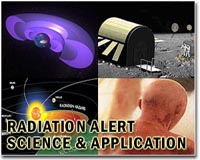 |
Hong Kong (AFP) March 15, 2011 Japan's nuclear crisis has sparked panic buying of iodine pills, with online bids exceeding $500 for one packet, but health experts hosed down the hysteria and warned the pills are of limited use. As fresh blasts rocked a stricken atomic plant on Japan's east coast, and crews worked frantically to cool reactors that emitted dangerous levels of radiation near the facility, jitters spread to Tokyo and beyond. US-based firms selling potassium iodide, a preventative treatment for radiation sickness, completely ran out of stock and pharmacies across the country's Pacific-facing West Coast had a rush on the over-the-counter pills. "We are quite slammed with orders, but we are working as fast as we can to get orders out," said NukePills.com, which had sold out of iodine tablets and was fast exhausting oral liquid supplies. "We are experiencing delays in shipping due to the Japan nuclear crisis. A delay in shipping may be a week or more." Potassium iodide is a salt used to saturate the thyroid gland to block the uptake of radioactive iodine, a highly carcinogenic substance that can leak from nuclear reactors in an accident. Another major supplier, Anbex, said it was also out of stock and did not expect to get new supplies until April 18. One packet of 14 pills had attracted bids of up to $540 at online auction house eBay and talk about radiation poisoning was so feverish on Twitter and other forums that the World Health Organisation issued a statement urging calm. "Consult your #doctor before taking #iodine pills. Do not self-medicate!" the WHO said on its Twitter page. Iodine pills are "not radiation antidotes" and offer no protection against radioactive elements such as caesium, the UN's health agency said, stressing they also carried health risks for some people, including pregnant women. The WHO also warned against drinking or applying iodine liquid after a rush on the antiseptic wound cleaner in Asian countries, where iodine pills are typically only available in hospitals or by prescription. "It is crazy, people have been reading about the situation in Japan and they are demanding iodine tablets, but most pharmacies don't stock the tablets," said Kuala Lumpur pharmacist Paul Ho. "There have also been text messages and emails going round that you can use the iodine antiseptic solution, which you place around your neck, to help cut down on radiation absorption," he added. Such a treatment would be utterly ineffective, but Ho said "we have run out of all our iodine antiseptic solution at the moment". One SMS text message, also circulating in China, Hong Kong and the Philippines, is billed as a BBC "newsflash" and urges Asians to "take precautions" including sheltering indoors and swabbing the thyroid region of the neck with iodine. "The BBC has issued no such flash but it has caused particular panic in the Philippines," a BBC News website story said. Philippine Health Secretary Enrique Ona dismissed any need for a rush order of iodine. "Let me be very clear, we don't see the necessity for that," he said. "We know where we can get it if necessary. But we are not going to order it yet." The Hong Kong Observatory, an official government body, stressed that radiation levels in the Chinese territory were "normal". "The rumour that the radiation will affect Hong Kong is unfounded," it said. Malaysia's health minister Liow Tiong Lai also dismissed the purported warning as "nonsense", and said there was "no need to apply such solutions to the neck and private parts". "People must not panic. The health ministry is keeping very close tabs on the situation," he told AFP. The assurances were echoed in Taiwan, but nevertheless officials were preparing to hand out 100,000 boxes of iodine tablets to residents near two nuclear plants in New Taipei city. Stephen Tsui, a biomedical expert from the Chinese University of Hong Kong, described the risk of contamination outside of Japan as "low" but said "all countries could be affected" in the region if the Fukushima plant had a total meltdown. Tens of thousands have already been evacuated from a zone within a radius of 20 kilometres (12 miles) of the 40-year-old plant, where authorities said radiation levels reached dangerous levels Tuesday. burs-ajc/jit/jah
Share This Article With Planet Earth
Related Links Space Tourism, Space Transport and Space Exploration News
 US West Coast: on frontline from nuclear cloud?
US West Coast: on frontline from nuclear cloud?Los Angeles (AFP) March 14, 2011 California is closely watching the crisis at a Japanese nuclear plant, but officials downplayed the threat that a radioactive cloud blown across the Pacific could pose for the US West Coast. While radioactivity could reach the United States from the quake-hit Fukushima plant, the levels would not be high enough to cause major health problems, said the Nuclear Regulatory Commission (NRC). ... read more |
|
| The content herein, unless otherwise known to be public domain, are Copyright 1995-2010 - SpaceDaily. AFP and UPI Wire Stories are copyright Agence France-Presse and United Press International. ESA Portal Reports are copyright European Space Agency. All NASA sourced material is public domain. Additional copyrights may apply in whole or part to other bona fide parties. Advertising does not imply endorsement,agreement or approval of any opinions, statements or information provided by SpaceDaily on any Web page published or hosted by SpaceDaily. Privacy Statement |